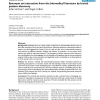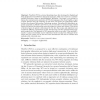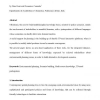108 search results - page 5 / 22 » Building and Using a Lexical Knowledge Base of Near-Synonym ... |
DSS
2006
13 years 7 months ago
2006
There has been a tremendous growth in the amount of information and resources on the World Wide Web that are useful to researchers and practitioners in science domains. While the ...
BMCBI
2008
13 years 7 months ago
2008
Background: Although there are a large number of thesauri for the biomedical domain many of them lack coverage in terms and their variant forms. Automatic thesaurus construction b...
JUCS
2002
13 years 7 months ago
2002
: WordNet (WN) is a lexical knowledge base, first developed for English and then adopted for several Western European languages, which was created as a machinereadable dictionary b...
CORR
2006
Springer
13 years 7 months ago
2006
Springer
Oftentimes, the need to build multidiscipline knowledge bases, oriented to policy scenarios, entails the involvement of stakeholders in manifold domains, with a juxtaposition of d...
COLING
1996
13 years 8 months ago
1996
This paper addresses the issue of word-sense ambiguity in extraction from machine-readable resources for the construction of large-scale knowledge sources. We describe two experim...



